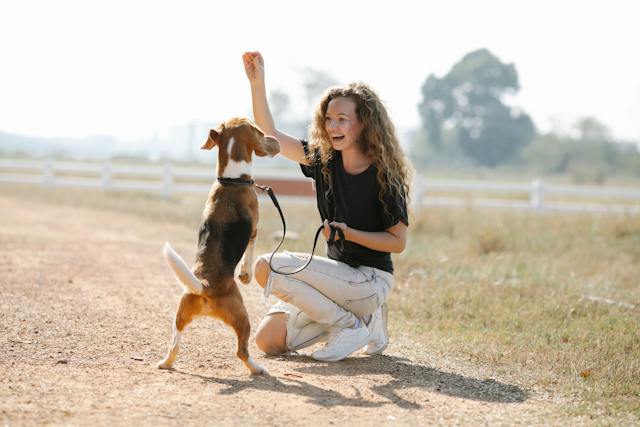The arrival of a new year signifies a symbolic blank slate, an opportunity to embark on a journey of self-improvement and well-being. Adopting healthy habits with your pet can be a wonderful way to enhance both you and your furry friend’s well-being.
Here are some New Year health habits you can consider:
Regular Exercise:
Commit to daily walks, runs, or playtime to keep both you and your pet active! Explore new outdoor activities, such as hiking or agility training.

Balanced Nutrition:
Consult with your veterinarian to ensure your pet is on a balanced and appropriate diet. Consider incorporating fresh fruits and vegetables into your pet’s meals (ensure they are safe for pets).
Hydration:
Always provide fresh water for your pet. Providing fresh water to pets daily is crucial to ensure proper hydration, support vital bodily functions, and maintain overall health and well-being. Monitor your pet’s water intake, especially during hot weather or increased activity.
Regular Veterinary Check-ups:
Schedule regular veterinary visits for check-ups and vaccinations. Discuss preventive measures for common health issues.
Mental Stimulation:
Engage your pet in puzzle toys or interactive games to stimulate their minds. Rotate toys regularly to keep them interested and prevent boredom. For dogs, balls, frisbees, or other fetching toys can satisfy a dog’s natural instinct to retrieve. Puzzle toys or feeders that dispense treats as the dog plays can provide mental stimulation. For cats, interactive wands with feathers or enticing attachments allow for simulated hunting and pouncing. Many cats are drawn to toys filled with catnip, providing sensory stimulation and excitement.

Grooming Routine:
Establish a regular grooming routine, including brushing, nail trimming, and dental care. Check for any lumps, bumps, or abnormalities during grooming sessions. Collar Cuts comes to you, so you don’t even have to drive anywhere for your pet’s regular groom! Contact us to book an appointment.
Weight Management:
Monitor your pet’s weight and adjust their diet and exercise accordingly. Obesity in pets can lead to various health issues, like diabetes, high blood pressure, arthritis, breathing problems, kidney disease, and some forms of cancer, so strive to maintain a healthy weight.
Training and Enrichment:
Continue or start training sessions to reinforce good behavior. Introduce new tricks or activities to keep your pet mentally stimulated.
Socialization: Arrange playdates or visits to dog parks to encourage socialization. Social interactions are essential for the mental health of many pets, helping them to gain confidence and be a well-rounded companion.
Dental Care:
Incorporate dental hygiene into your routine, such as regular teeth brushing or dental treats. Dental health is crucial for preventing issues like gum disease and tooth decay.
Create a Safe Environment:
Ensure your home is pet-friendly by removing hazards and providing a secure space. Consider pet-proofing your home for the safety of your furry friend.
Quality Time:
Spend quality time bonding with your pet through cuddling, playing, or simply being present. Building a strong emotional connection is beneficial for both you and your pet.
Remember to consult with your veterinarian before making significant changes to your pet’s diet or exercise routine. Tailor these habits to your pet’s individual needs and health considerations.
Sources:
avma.org
Truecareveterinaryhospital.com
dogtopia.com
Openai.com

